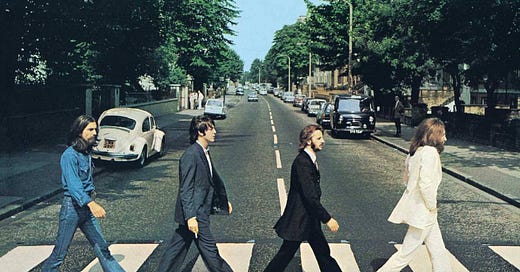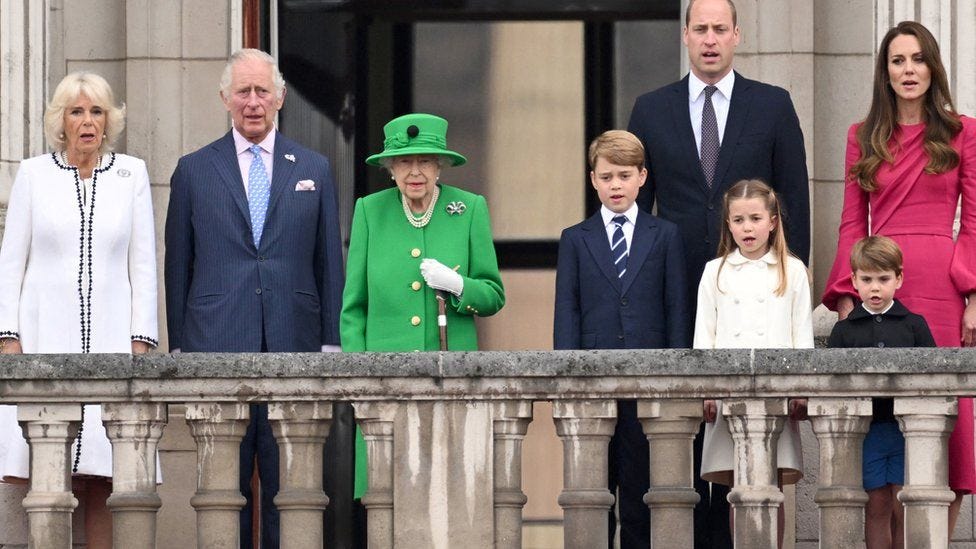Are you going to be in my dreams tonight?
The Beatles - 'The End' / 'Her Majesty' (Abbey Road - 1969)
So far on The Run Out Grooves, we have looked at many types of endings and goodbyes. Conclusions can be triumphant, they can be drawn out, and they can be sad or bittersweet. Recent entries have looked at friends and family leaving us. Abbey Road by The Beatles is a type of goodbye we’ve only really covered once before. The known goodbye, the farewell where you have to think about how to say it.
Unlike David Bowie, none of The Beatles were dying in 1969. They’d been through the absolute hell / mild annoyance1 of recording Let It Be in early 1969 and knew Abbey Road would be a swansong. It came out before Let It Be and the official, legal split of the band in 1970, and I wonder how many people got to see the writing was on the wall from how the album is constructed and arranged. I think it was clear the band knew they had one last chance to say goodbye, on a note of triumph, amongst the sadness.
Bowie’s Blackstar seems an obvious farewell now, even The Next Day does, looking at the context of what Bowie was singing about for that whole mid-2010s period. None of this struck anyone until his death was announced. The Pitchfork review on release started with this line.
David Bowie has died many deaths, yet he is still with us
A tweet from days later captured it perfectly for me;
Where does the end of Abbey Road, Side Two’s ‘The Long One’ melody and the closing track ‘The End’ / ‘Her Majesty’ fit in with this? As I write this in September 2022, I think we have seen two goodbyes from central characters in these songs in June this year. One has come to pass, and the other has not yet.
The first was the Platinum Jubilee of Her Majesty herself, Queen Elizabeth II, at the start of June, and the second was Paul McCartney’s headlining Glastonbury performance at the end of the month. It was apparent, even if people didn’t want to say it, that The Queen’s health had deteriorated since the death of her husband, Prince Philip, in 2021, with fewer and fewer public appearances and engagements after.
With the prospect of an Oak Jubilee in 2032 extremely unlikely even in June, the celebrations were an opportunity for the parts of the nation that wanted to say thanks, to do that and for The Queen to give one final wave from the Buckingham Palace balcony, she has been pictured on so many times.
Later that same month, Paul McCartney gave us a Glastonbury headlining performance for the ages. Showcasing a back catalogue that runs from the early 1960s to the early 2020s over three hours with a virtual John Lennon, Bruce Springsteen and Dave Grohl joining him and the latter two coming back to the stage for, what else, ‘The End’. Again, even at the time, the NME said;
[McCartney is] sounding like a man who knows he might not do this again.
No one is suggesting McCartney is not long for this world;2 more likely that he will still be touring and playing big venues worldwide and in the UK. It's that he’s not expected to be headlining at Worthy Farm again; his previous headline was 2004. I think he knew that, and the 4 million people watching the BBC's coverage, some as late as 1 am on a Monday (including my parents), did as well. I also rewatched the last hour at the first available opportunity. If you know this is goodbye, some people know how to land it because McCartney has done it before.
As July 1969 turned into August 1969, the Beatles started bringing the side two melodies together. Originally called ‘Ending,’ it includes Ringo Starr’s only drum solo for the band;3 with any other instruments removed and spread over two tracks, you can hear the snare in the right channel - an innovation. Like we’ve said all along here, some of the best album closers bring the themes of the records together for suitable conclusions - how do you do that for a whole career, never mind for the biggest and most lauded band in history?
The Beatles go out with all three guitarists soloing, not something they did much of across their output, and never taking turns like this. For me, it is no surprise that a band that surfed on the zeitgeist's crest so often that on their final album, which was recorded on the brink of the seventies, previews the stadium rock sound of that decade as they enjoy their moment in the sun4.
First, you get McCartney with an acidic, psychedelic turn - much like we hear from him on ‘Taxman’ and ‘Good Morning, Good Morning’. Then it is George Harrison, sounding a lot like he would do on his forthcoming triple album All Things Must Pass before the heavy, fuzzy guitar we heard from Lennon on ‘Revolution’ and earlier on the album on ‘I Want You (She’s So Heavy)’.
Then we arrive at an (almost) final word from the band, what a line to go out on. If you go through the band’s output word by word and strip out “I”, “you”, “me, “and”, “the” alongside the other common words from the English language, number one by a considerable margin is “Love”. McCartney says in the Anthology TV series that he was;
…really glad that most of our songs were about love, peace and understanding
It is also the line included in every email from this newsletter, and it is hard to think of a better epitaph for the band5. It references the melancholy A minor of 'You Never Give Me Your Money' but resolves on a C Major, the chord that Bob Dylan called a key of strength and regret.
But that isn’t quite it; after such a build-up and release and a respectful moment of silence, we have a throwaway, hidden track - one of the first to be included on a record. ‘Her Majesty’ appears; it was initially placed between 'Mean Mr Mustard' and 'Polythene Pam'6 - which is why you hear that crashing chord at the start of it; it is from the end of ‘Mean Mr Mustard’. In Ian McDonald’s Revolution In The Head, he says that;
McCartney rightly judged that it didn’t fit and told second engineer John Kurlander to cut it out and throw it away. Kurlander, who had been instructed never to discard anything The Beatles recorded, instead edited it, for convenience’s sake, to the end of the Medley … When McCartney heard this the following day, he liked the random effect.
It is a moment of light after the formality of everything that went before. Just as Lennon encouraged those not in the cheaper seats at the 1963 Royal Variety Performance to “rattle their jewellery”, McCartney is plucking up the courage to tell her he loves her a lot, but he’s got to get a bellyful of wine just as he might have done for any woman who wasn’t among the most famous in the world.
The final, final act is a chord that, until it was included in The Beatles: Rock Band, was left incomp-
Delete as appropriate following and reading anything on the subject before last year’s Get Back film and afterwards.
https://www.paulmccartney.com/news/you-gave-me-the-answer-when-did-you-first-get-into-yoga?
He had to be coaxed into doing it.
The solos last between three and five seconds, two bars each, so they each get about 12 seconds to showcase.









Loved how you finished this po-
Coupla great revelations, Mitchell! 1) I had no idea Ringo never soloed before "The End," which only cements my notion that he was all about band and song! 2) I love that Ian McDonald excerpt about Paul and the snippet!
Not only does it say a lot (of good things) about Paul, but it makes me wonder just who (and when in their storied existence) did someone actually say, "Don't throw anything away," with the apparent awareness that everything they laid down was going to, one day, be historically significant! In short, thanks, Mitchell!
For casual readers who've yet to subscribe to "The Run Out Grooves," join me in doing so!🎼🎵🎸😁